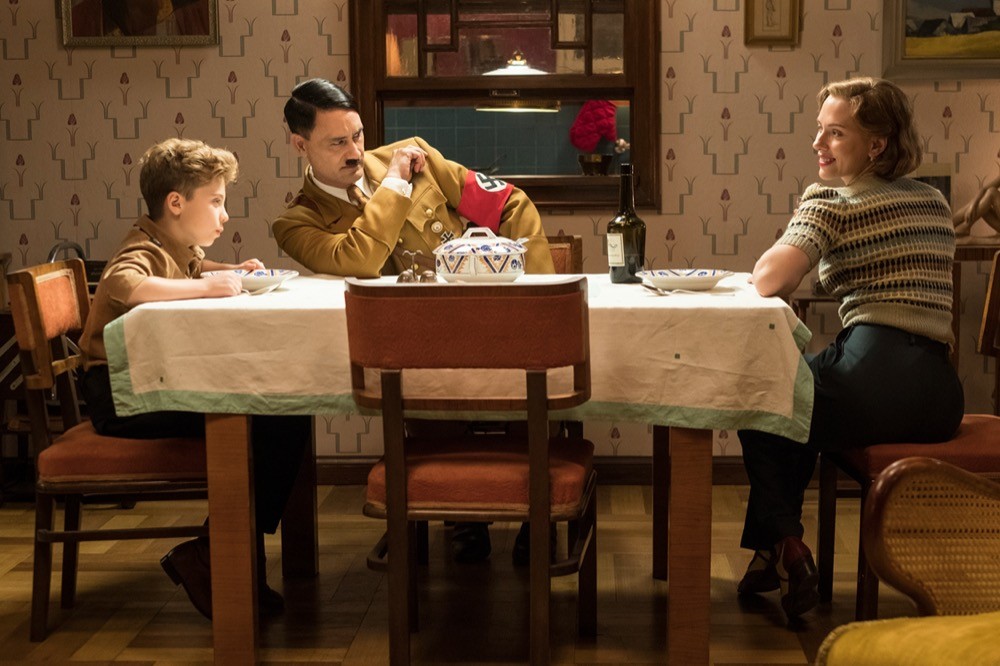Jojo Rabbit
Jojo Rabbit, 2019, 4 stars
Rare Rabbit
Nazi parody is an original mix of comedy and drama
From The Orlando Weekly, November 6, 2019
Is it ever acceptable to laugh at Adolf Hitler?
Charlie Chaplin was the first to answer that question (in the affirmative), though Hitler’s greatest crime had not yet been committed when Chaplin released The Great Dictator in 1940. Other filmmakers would later agree with Chaplin, most notably Mel Brooks in 1967, with The Producers (“Springtime for Hitler”). But we’ve never seen Nazism parodied quite like it is in Jojo Rabbit, writer-director Taika Waititi’s surprisingly eclectic genre mash-up.
The film, which is based on Christine Leunen’s 2004 book Caging Skies, recounts the final years of World War II though the eyes and imagination of a 10-year-old German boy affectionately nicknamed Jojo. But when Jojo goes to Hitler Youth camp and ignores orders to kill a bunny, his moniker gets an unaffectionate addition: “Rabbit.” To cope with the bullying, he turns to his best companion, an imaginary version of his hero, Hitler. It’s through this fictional friend that Jojo can process the events of the war, which include his father’s absence, his sister’s death and his nation’s impending annihilation.
Viewing Nazi Germany from a child’s perspective is not new. Most notably, The Boy in the Striped Pajamas, from 2008, painted a heartbreaking portrait of a youth uncovering the evil of the Third Reich. Jojo Rabbit eventually reaches a similar destination, but being a Waititi film, its journey is different. Known for his broad and, frankly, overrated comedies (What We Do in the Shadows, Hunt for the Wilderpeople), the New Zealand writer-director keeps his movie on a comedic path for the first half, with Waititi himself playing the aforementioned, cartoonish characterization of Hitler. But after he unexpectedly befriends a Jewish girl his mother has hidden in their attic, Jojo starts to comprehend the lunacy of the Nazi’s racist ideology. This discovery, coupled with the accelerating societal breakdown, turns the film from a typical Waititi romp into something much deeper.
Still, the film almost never loses its humor. In fact, you might find yourself uncomfortable with your own laughter, considering the subject. This odd mix of mirth and madness won’t be everyone’s taste, and the climax could use a touch more intellectualism. But the movie is made palatable by a relevant message of tolerance wrapped in quasi-farcical satire and delivered by a filmmaker with Jewish heritage.
Though Waititi’s performance is mostly enjoyable, the other actors are more impressive in their balancing act of laughter and tears. Roman Griffin Davis as Jojo, Thomasin McKenzie as the Jewish girl, Archie Yates as Jojo’s best (non-imaginary) friend, Sam Rockwell as the director of the Hitler Youth camp and, most notably, Scarlett Johansson as Jojo’s mother comprise one of the strongest ensembles of any film this year. (This is Johansson’s second triumph of 2019 if you include the forthcoming Marriage Story.) And even the normally over-the-top Rebel Wilson has her moments.
“None of this should be weird,” Hitler tells Jojo, attempting to explain his imaginary presence in a house that’s harboring a Jew.
But, on the contrary, the film is wonderfully weird and irresistibly askew, punctuated by hilarity, tragedy and even anachronistic music. Yes, that’s really the Beatles singing in German. And by the film’s end – to paraphrase the Fab Four – you might want to hold Waititi’s hand and declare “danke schoen.”
© 2019 Orlando Weekly / MeierMovies, LLC
A capsule review of this film also appeared in my opening blog for the 2019 Orlando Film Festival, at which the movie received its Florida premiere.
